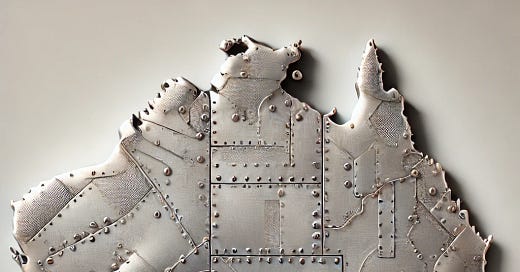How to Lose a Competitive Market in 10 Days
"Buy Australian" will lead to a country run by monopolies
In response to Trump’s tariffs, the idea of prioritizing Australian-made goods in government projects has gained traction. Rather than retaliating with tariffs that could hurt our own consumers, some argue that the best response is to direct infrastructure spending and government-funded programs toward locally produced materials. Why not support Australian industry while ensuring high-quality materials for public works?
Indeed, as New South Wales Treasurer Daniel Mookhey pointed out, Australian steel is often easier to customize, of higher quality, and easier to transport. On the surface, it appears to be a win-win-win. So why is the "Buy Australian" approach to government procurement a terrible idea?
Unfortunately, Q&A wasn’t bold enough to include an economist on the panel, but here’s how one would have responded.
The Monopoly Problem
Every Australian knows the pain of having only two major options when shopping—whether it’s Coles and Woolworths, Qantas and Virgin. The average Aussie understands that when competition is scarce, prices are high, and choices are limited.
The same principle applies to the Australian steel industry. According to a recent parliamentary report, the entire market is dominated by two massive suppliers—BlueScope Steel and the Whyalla Steel plant. What happens when you remove the ability to shop around internationally and limit procurement to a domestic duopoly? Prices rise, and quality declines.
Indeed it is worse than that as steel is not even a single homogenous product. There are many different types, and many are produced by only a single supplier in Australia. For instance, BlueScope Steel is the sole domestic producer of flat steel, commonly used in key infrastructure projects.
If the Australian government were to announce that they were going to only buy flat steel from Australian producers, then BlueScope Steel would start laughing all the way to the bank. Knowing that they are the only Australian supplier, they would rip us off and charge massively higher prices for a product that only they can supply in the domestic market. That is why, especially for a small country such as Australia, importation and the ability to shop around is incredibly important when it comes to saving money
Just as being forced to book every flight with Qantas would hurt consumers, forcing the government to buy only from a domestic duopoly would lead to skyrocketing prices. And when those costs are borne by taxpayers, it means fewer hospitals, fewer schools, and fewer essential infrastructure projects.
Importing Competition
Even if you believe, as Mookhey argues, that Australian steel is often of higher quality, the best way to ensure value for money isn’t to lock in domestic suppliers—it’s to keep competition alive. The mere threat of international competition forces Australian producers to offer better deals.
Think of airlines: even if you usually fly Qantas, the existence of competitors like AirAsia keeps Qantas’ prices in check. Without competition, there’s no incentive for suppliers to remain efficient or price competitively.
This problem isn’t unique to Australia. "Buy Local" policies have proven costly in larger economies like the United States, where they have resulted in higher infrastructure costs and inefficiencies. In a small country with a limited industrial base, such policies are even more disastrous.



